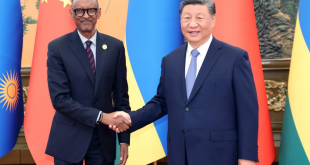By staff writer

China supported Hawassa Industrial Park in Hawassa, Ethiopia. (Xinhua/Michael Tewelde)
In recent years, China presence in Africa is visible, from investments in infrastructure to trade partnerships and cultural exchanges. This growth has been met with both enthusiasm and skepticism. Critics, primarily from Western nations, argue that China’s involvement in Africa is a form of modern-day colonization or a “debt trap” aimed at exploiting the continent’s resources. However, a deeper look reveals that China’s approach offers distinct advantages to African nations, which are often overlooked in the Western narrative.
China has invested heavily in African infrastructure, including roads, railways, ports, and airports, which are crucial for economic growth. Many African countries face infrastructural deficits that hinder trade, mobility, and overall development. For example; the Addis Ababa-Djibouti Railway, funded by China, has significantly reduced transportation costs and improved regional connectivity. These infrastructure projects create jobs, stimulate local economies, and enable African countries to better integrate into global markets, thus providing long-term sustainable development.
China has become Africa’s largest trading partner, offering a market for African raw materials like oil, minerals, and agricultural products. This trade partnership helps African countries diversify their economies, moving away from over-reliance on former colonial powers.
Chinese companies also bring advanced technologies and expertise to Africa, which are critical for industrialization. This includes everything from telecom infrastructure (e.g., Huawei’s role in improving mobile networks) to new energy solutions (e.g., solar power projects).
China has provided scholarships for thousands of African students, which contributes to building a skilled workforce across the continent. In 2018, China pledged to offer 10,000 scholarships to African students annually. These educational programs help build the next generation of African leaders, entrepreneurs, and professionals, strengthening the continent’s human capital.
China has supported African countries in health care by sending medical teams, providing medicines, and building hospitals. In the face of health crises like the Ebola outbreak and the COVID-19 pandemic, China’s contributions have been essential in saving lives and building health infrastructure. In 2014, China sent more than 1,000 medical professionals to help fight the Ebola epidemic in West Africa.
Critics argue that China’s lending practices amount to a “debt trap” for African nations. However, the situation is more nuanced. China has provided loans at relatively lower interest rates than Western institutions, with longer repayment periods. These loans often go toward projects that have the potential to generate significant economic returns. China has demonstrated flexibility in debt restructuring when necessary. For instance, China has offered debt relief or deferrals for countries facing financial strain, as seen with Zambia in 2020.
China’s rise as a global economic powerhouse provides African countries with a strategic partner that is independent of Western influence. By fostering closer ties with China, African nations are able to diversify their diplomatic and economic relations, ultimately enhancing their negotiating power on the global stage.
China’s involvement in Africa is framed not only in terms of economic gain but also as part of a broader, long-term partnership. The Belt and Road Initiative (BRI), for instance, aims to connect African countries to the global economy through enhanced infrastructure and trade routes.
China’s presence in Africa doesn’t necessarily replace Western support but complements it. In fact, some argue that China’s involvement can push Western countries to increase their own investment and development efforts on the continent.
The future of Africa-China relations should be one of mutual respect and shared prosperity. As African nations continue to develop and diversify their economies, China will remain a key player in this journey, helping to bridge the infrastructure and technological gaps that have historically held back the continent’s growth.
The narrative that China is “re-colonizing” Africa or creating a “debt trap” fails to acknowledge the broader, more complex dynamics of African development. China’s investments are empowering African nations to pursue economic independence and growth, offering an alternative model of development and cooperation. The relationship between China and Africa holds the potential for long-term mutual benefits, provided it remains rooted in transparency, respect for sovereignty, and sustainable growth.
 Africa -China Review Africa -China Cooperation and Transformation
Africa -China Review Africa -China Cooperation and Transformation
